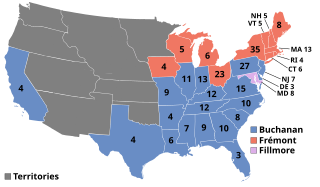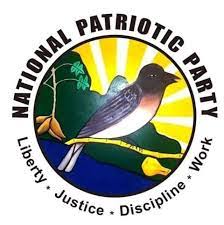
Presidential elections were held in the United States on November 4, 1856. Democratic nominee James Buchanan defeated Republican nominee John C. Frémont and Know Nothing/Whig nominee Millard Fillmore. The main issue was the expansion of slavery as facilitated by the Kansas–Nebraska Act of 1854. Buchanan defeated President Franklin Pierce at the 1856 Democratic National Convention for the nomination. Pierce had become widely unpopular in the North because of his support for the pro-slavery faction in the ongoing civil war in territorial Kansas, and Buchanan, a former Secretary of State, had avoided the divisive debates over the Kansas–Nebraska Act by being in Europe as the Ambassador to the United Kingdom.

The president of the Republic of Liberia is the head of state and government of Liberia. The president serves as the leader of the executive branch and as commander-in-chief of the Armed Forces of Liberia.

Joseph Jenkins Roberts was an American merchant who emigrated to Liberia in 1829, where he became a politician. Elected as the first (1848–1856) and seventh (1872–1876) president of Liberia after independence, he was the first man of African descent to govern the country, serving previously as governor from 1841 to 1848. He later returned to office following the 1871 Liberian coup d'état. Born free in Norfolk, Virginia, Roberts emigrated as a young man with his mother, siblings, wife, and child to the young West African colony. He opened a trading firm in Monrovia and later engaged in politics.

The National Patriotic Party (NPP) is a political party in Liberia. It was formed in 1997 by members of the National Patriotic Front of Liberia following the end of the First Liberian Civil War.

General elections were held in Liberia on 11 October 2005, with a runoff election for the presidency held on 8 November. The presidency and all seats in the House of Representatives and Senate were up for election. The elections were the first held since 1997 and marked the end of the political transition following the second civil war, having been stipulated in the Accra Comprehensive Peace Agreement of 2003. Ellen Johnson Sirleaf, former World Bank employee and Liberian finance minister, won the presidential contest and became the first democratically elected female African head of state in January 2006.

The Unity Party (UP) is a political party in Liberia that was started in 1984 by Edward B. Kesselly, also its first standard bearer. Officially founded in Buchanan, Grand Bassa County, the party was established on 27 July 1985. The Unity Party participated in the first elections after the 1980 coup, running against President Samuel Doe in October 1985. The party has remained active in Liberian politics since and is the current ruling party following the 2023 Liberian general election.

General elections were held in Liberia on 19 July 1997 as part of the 1996 peace agreement ending the First Liberian Civil War. The presidency, as well as all seats in the House of Representatives and the Senate were up for election. Voter turnout was around 89%. Former rebel leader Charles Taylor and his National Patriotic Party (NPP) won the election with 75.3% of the vote, giving it about three-quarters of the legislative seats according to the proportional representation system. Taylor was inaugurated as president on 2 August 1997.

The Liberia Destiny Party (LDP) was a political party in Liberia.

The Legislature of Liberia is the bicameral legislature of the government of Liberia. It consists of a Senate – the upper house, and a House of Representatives – the lower house, modeled after the United States Congress. Sessions are held at the Capitol Building in Monrovia. Legislature of Liberia is considered one of the three branches of government based on the Article III of the Constitution of Liberia that stipulates all three branches ought to be equal and coordinated based on the Principle of checks and balances.

The 1856 Republican National Convention was a presidential nominating convention that met from June 17 to June 19, 1856, at Musical Fund Hall at 808 Locust Street in Philadelphia, Pennsylvania. It was the first national nominating convention of the Republican Party, founded two years earlier in 1854. It was held to nominate the party's candidates for president and vice president in the 1856 election. The convention selected John C. Frémont, a former United States Senator from California, for president, and former Senator William L. Dayton of New Jersey for vice president. The convention also appointed members of the newly established Republican National Committee.

The vice president of the Republic of Liberia is the second-highest executive official in Liberia, and one of only two elected executive offices along with the president. The vice president is elected on the same ticket with the president to a six-year term. In the event of the death, resignation or removal of the president, the vice president ascends to the presidency, and holds the position for the remainder of their predecessor's term. The vice president also serves as the president of the Senate and may cast a vote in the event of a tie. The current vice president is Jeremiah Koung, serving under president Joseph Boakai. He began his term on January 22, 2024.

A referendum to amend the Constitution of Liberia was held on 23 August 2011. Voters chose whether to ratify four amendments regarding judge tenure, elections scheduling, presidential candidate requirements and the electoral system. The National Elections Commission of Liberia (NEC) oversaw the referendum.

A constitutional referendum was held in Liberia on 27 September 1847. The new constitution would create a President with executive powers and a bicameral Legislature. It would also restrict voting rights to those of African descent and landowners. It was approved by 79% of voters. In Monrovia, Millsburg, Bassa Cove and Bexley 100% of voters supported the constitution, whilst 100% voted against it in Sinoe. In Edina opponents of the constitution prevented the polling station opening, and a fist-fight broke out between Amos Herrnig and Ephraim Titler, two of the Liberian Declaration of Independence signatories. Opponents of the constitution in Bassa Cove and Bexley chose not to vote.
Nathaniel Brander (1796–1870) was an Americo-Liberian politician and jurist who served as the first vice president of Liberia from 1848 to 1850 under President Joseph Jenkins Roberts.
Anthony David Williams was a Liberian politician who served as the second vice president of Liberia from 1850 to 1854 under President Joseph Jenkins Roberts. Born free in the United States in 1799, he immigrated as a Methodist preacher from Petersburg, Virginia to Liberia in 1823. Williams served as the Colonial Agent for the American Colonization Society from 1837 to 1839. During his tenure, the colony of Mississippi-in-Africa was established. In the 1849 elections, Williams ran for vice president against incumbent Nathaniel Brander. The failure of any candidate to secure a majority of the vote led the race to be thrown to the House of Representatives, which chose Williams as vice president. He died in 1860.

The United States elections of 1788–1789 were the first federal elections in the United States following the ratification of the United States Constitution in 1788. In the elections, George Washington was elected as the first president and the members of the 1st United States Congress were selected.
The following lists events that happened during 1849 in Liberia.

General elections were held in Liberia on 10 October 2017 to elect the President and House of Representatives. No candidate won a majority in the first round of the presidential vote, so the top two finishers – CDC standard-bearer Amb. George Weah and UP standard-bearer Vice President Joseph Boakai – competed in a run-off on 26 December. The second round was originally scheduled for 7 November, but was postponed after LP standard-bearer Cllr. Charles Brumskine, in third place, challenged the result in the Supreme Court. The Supreme Court dismissed the challenge, which would have forced a re-run of the first round had it been successful, and the second round was held on 26 December. Weah emerged victorious with 60% of the vote.

Legislative elections were held in Liberia on 1 December 1840.

General elections were held in Liberia on 10 October 2023 to elect the President, House of Representatives and half of the Senate. Incumbent president George Weah was eligible for a second term. No candidate won a majority in the first round, with Weah narrowly placing first over opposition leader Joseph Boakai, which meant both advanced to a runoff held on 14 November 2023. Boakai defeated Weah by just over one percentage point in the closest runoff in Liberia's history, and Weah conceded the election peacefully.













